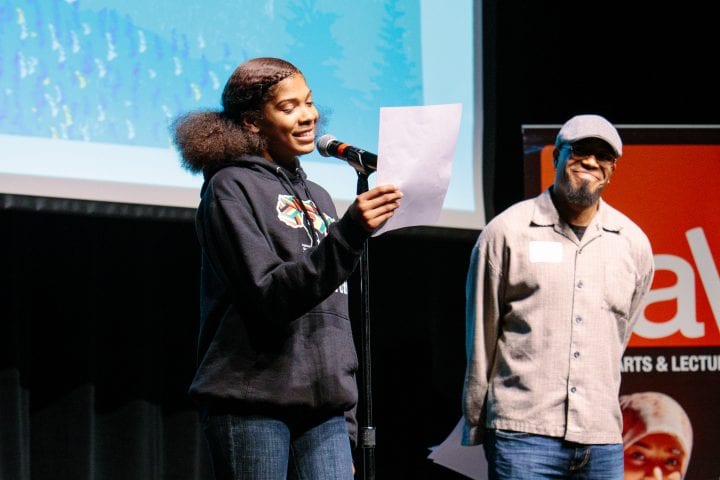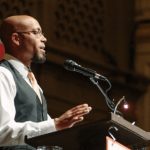
WITS Voices: “She Does Not Know Her Beauty”
July 9, 2019
By Daemond Arrindell, WITS Writer-in-Residence
“She does not know her beauty” is one of the first lines in a poem by singer-songwriter and performance poet Iyeoka Okoawo that I use as a mentor text in a lesson I facilitate about reclamation. Iyeoka is a Black woman of Nigerian descent from Boston. The poem provides a look back at a younger version of herself, acknowledging the positives she was unable to see, and the negatives she focused on due to societal standards and expectations.
The students I have the privilege of working with are predominantly Black and Brown, with a small smattering of White students. Some are homeless, some are on the verge of it, and some are financially stable, or at least they appear that way, but in today’s economy a lot of families are one paycheck or one medical setback away from dire straits. Regardless of socio-economic status and race, all of my students are immensely influenced by the media and as such they are subject to those same societal standards, expectations as well as stereotypes.
Retrospect is simple – looking back on past mistakes as fuel for the fires of wisdom we stoke daily – learn from the past. It tends to be easier to see where we went wrong than to see how intelligent, caring, capable, talented, powerful, hard-working we were much. In the face of advertising that stares back at us nearly 24/7 with a downturned nose and an attitude of “you better fix that,” there is little room for positivity, affirmations, or empowerment. Students can brag about their newest kicks and their phone, but shut me down with a quickness when I tell them they are creative or intelligent. All the more reason for reclamation.
Big Idea/Focus: reclaiming what makes us different and changing the tone helps us see ourselves in new ways.
The warm up activity for this learning plan is to make a list of characteristics that make us unique or stand out. I preface that the students will not have to share these with anyone else or out loud. I write mine up on the board:
being one of the only Black kids in my classes, skinny, flat/monotone voice, being broke, being a Black swimmer, not being into or knowing anything about most mainstream sports.
I encourage the students to include the physical as well as personality. I discuss my “flaws” and then share the following definition:
Reclamation: rescuing from error and returning to a rightful course, the act of restoring something or someone to a satisfactory state.
But I clarify, that one might take this to mean to fix our flaws, but in this case what I am hoping for is that we will change our attitudes about the things that make us different. That different, simply means different. And in fact, it is these differences that make us unique and special, so why not celebrate them and proudly reclaim them. After we watch Iyeoka perform her poem and reflect on its meanings, specifically spending time on the line:
“But I cannot reach her –
if she chooses to be blind, only she can choose to see.”
I ask the students to look back at a younger version of themselves and write about what they could not see. Below are some of the results…
Excerpts from Mariama’s poem “I wish she knew”:
My name is Mariama. My name means GIFT OF GOD.
I wish this little girl knew not to fight always.
That she is more than other people’s words.
But inside she thinks they are saying it to make themselves feel better.
I wish this little girl knew how beautiful she is
I wish she knew that she is African and that is what makes her different.
I wish she knew how lucky she is to have been born in this beautiful color.
Nasteho in her poem “She” wrote:
Indeed, she is her own self
She does not know she is creative.
She let her thoughts get in her way but
She just needed to be more innovative
No one told her society was full of hate
And some excerpts from what Van wrote:
We came here
Without fear
We bear and we hear
Every word really clear
“They don’t belong here”
We were the lost
We were the lonely
Yellow skin and black hair
That’s how they see
But…
Why do we feel broken?
Cause our rights were taken
If they want us to be silent
Just make them listen
And understand our hidden
Then we’ll win our heaven.

Daemond Arrindell is a poet, performer, playwright and teaching artist. He is a faculty member of Freehold Theatre, where he has led poetry and theater residencies at Monroe Correctional Complex for men for over ten years. He is also adjunct faculty at Seattle University and a Writer-in-Residence through the WITS program and Skagit River Poetry Foundation.